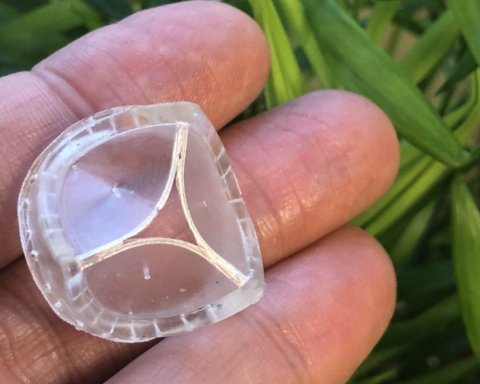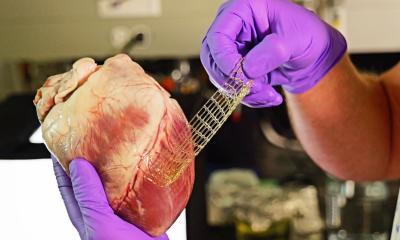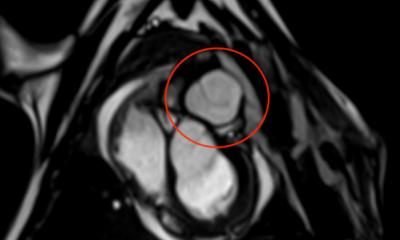News • Durable implant
New heart valve could transform open heart surgery
A new polymeric heart valve with a life span potentially longer than current artificial valves that would also prevent the need for the millions of patients with diseased heart valves to require life-long blood thinning tablets has been developed by scientists at the universities of Bristol and Cambridge.

Image credit: Professor Raimondo Ascione, University of Bristol
The team's latest in-vitro results, published in Biomaterials Science, suggest that the PoliValve could last for up to 25 years.
More than 1.3 million patients with diseased heart valves need valve replacement therapy globally each year. There are two artificial valves currently available for this; both have limitations either in durability or in biocompatibility. Biological valves are made from fixed pig or cow tissue and have good biocompatibility, meaning patients do not need life-long blood thinning tablets. However, they only last ten to 15 years before failing. While mechanical valves have very good durability, they have poor biocompatibility and patients must take daily blood thinning drugs to prevent life threatening complications due to blood clots.
Professor Geoff Moggridge, Head of the Structured Materials Group at Cambridge's Department of Chemical Engineering and Biotechnology and Professor Raimondo Ascione, NHS Adult Cardiac Surgeon and Head of the Translational Biomedical Research Centre (TBRC) at the University of Bristol have spent three years conducting developmental work and extra-vivo and in-vivo testing on the new PoliValve. The valve, created by Professor Moggridge, Dr Marta Serrani and Dr Joanna Stasiak at Cambridge and Professor Ascione in Bristol, and building on earlier work with Professor Costantino’s group, is made from a special co-polymer and is designed to resemble the flexibility, biocompatibility and durability of a natural heart valve.
The device combines excellent durability with biocompatibility, addressing the limitations of current biological and mechanical artificial valves. It is made through a simple moulding process; hence it also reduces markedly manufacture and quality control costs. Professor Moggridge, said: "These impressive results show the PoliValve is a promising alternative for valve replacement surgery. While further testing is needed, we think it could make a major difference to the hundreds of thousands of patients who get valve replacement surgery every year."
The new valve could help millions of people worldwide and we aim to test in patients within the next five years
Raimondo Ascione
Initial testing in animal has been undertaken at Bristol’s TBRC facility as a first mandatory in-vivo testing step to ensure safety. Long-term in-vivo testing is already planned and funded as a necessary additional step before bringing this new treatment to patients. Professor Sir Nilesh Samani, Medical Director at the British Heart Foundation, said: "Patients requiring an artificial heart valve are often faced with the dilemma of choosing between a metallic or tissue valve replacement. A metallic valve is long lasting but requires the patient to take lifelong blood thinning drugs. Although this medication prevents clots forming on the valve, it also increases the risk of serious bleeding. Patients who have a tissue valve replacement usually don’t need to take this medication. However, the valve is less durable and means the patient may face further surgery. The polymer valve combines the benefits of both – it is durable and would not require the need for blood thinning drugs. While further testing is needed before this valve can be used in patients, this is a promising development, and the BHF is pleased to have supported this research."
According to the ISO standards a new artificial heart valve must withstand a minimum of 200 million repetitions of opening and closing during bench testing (equivalent to five-year of life span) to be tested in humans. The new Cambridge-Bristol polymeric valve has comfortably surpassed this. The PoliValve has also exceeded the requirements of ISO standards for hydrodynamic testing, showing a functional performance in-vitro comparable to the best-in-class biological valve currently available on the market. The small feasibility pilot study in-vivo in three sheep at one to 24 hours after surgery has demonstrated the valve is easy to stitch in, no mechanical failure, no trans-valvular regurgitation, low trans-valvular gradients, and good biocompatibility at histopathology.
Professor Ascione added: "The transformational PoliValve results from an advanced Bristol/Cambridge-based biomedical cross-fertilisation between experts in biomaterials, computational modelling, advanced preclinical development/testing and clinical academics understanding the patient needs. The new valve could help millions of people worldwide and we aim to test in patients within the next five years."
Source: University of Bristol
30.06.2020











